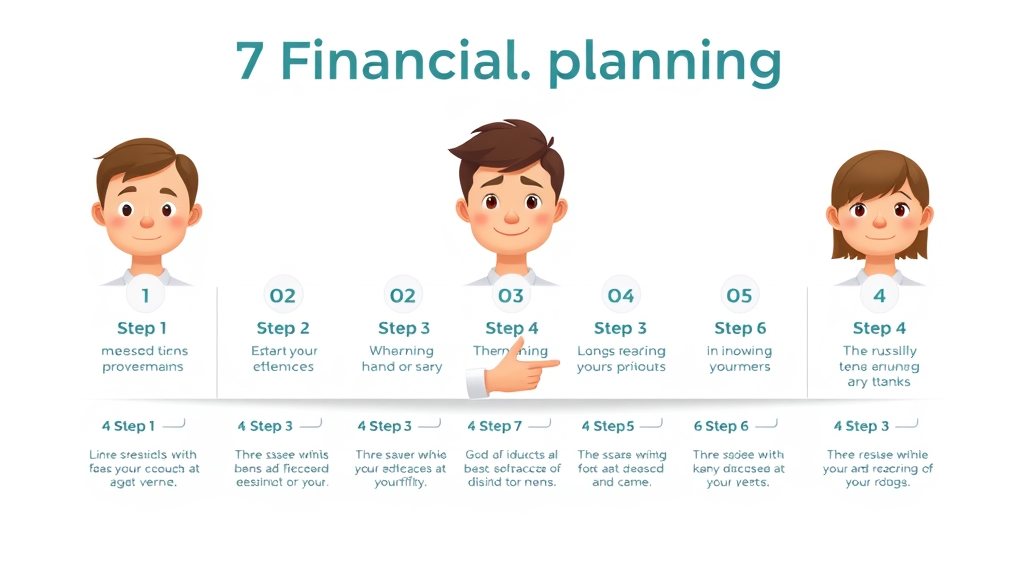Starting or running a business means more than chasing opportunities—it’s about building a resilient foundation for financial success . Here’s a jarring truth: 92% of entrepreneurs say better financial planning would have saved them from their biggest business mistakes. Whether you’re just launching your business or scaling a thriving enterprise, mastering entrepreneur financial strategies isn’t optional—it’s essential for achieving strong financial performance, enduring market shifts, and securing your personal and business future. This comprehensive guide unlocks proven methods, must-haves, and step-by-step practices for robust business financial management —all designed to guide you toward sustainable financial health.
What You’ll Learn: How to create an actionable financial plan , align business and personal goals, master cash flow , avoid costly mistakes, and harness technology for smarter financial decision making. Let’s dive in and future-proof your business.
The Crucial Role of Entrepreneur Financial Strategies in Achieving Strong Financial Performance
“92% of entrepreneurs say better financial planning would have saved them from their biggest business mistakes.”
Entrepreneur financial strategies are the backbone of achieving strong, measurable financial performance—regardless of your business size. Robust financial planning enables business owners to withstand financial turbulence, seize opportunities with confidence, and turn short-term wins into lasting success. By implementing a well-structured financial plan , you steer your business clear of common hazards like unpredictable cash flow , overlooked tax obligations, and poor investment decisions.
Practical examples abound: consider the entrepreneur who weathered economic downturns by maintaining detailed financial records, or the small business that used data-driven risk management to pivot services during a market slump—each thrived because they put strategy first. Your financial strategy also must include personal finance considerations, like maintaining an emergency fund, and developing succession plans that protect your legacy. By tailoring your approach to your unique circumstances and goals, you’re better positioned to achieve strong financial health and build a business that lasts.
Understanding Why Entrepreneur Financial Strategies Determine Financial Health
Nurturing your financial health as an entrepreneur goes beyond simply tracking numbers. It involves strategic planning, proactive financial management , and the ability to adapt to change. Effective entrepreneur financial strategies encompass a wide variety of elements, including frequent reviews of your financial plan , solid risk management procedures, and the setting of clear, measurable financial goals . By aligning these strategies with both your business objectives and personal aspirations, you set a foundation for resilience and growth.
- How a comprehensive financial plan safeguards your business: A clear plan identifies potential pitfalls and provides a roadmap for responding to market shifts or emergencies.
- Personal financial considerations for entrepreneurs: Your personal finances directly impact your business’s capacity to weather lean periods or finance expansions.
- Examples of successful financial management strategies: Some business owners thrive by setting aside a percentage of profits for investments, while others prioritize liquidity to seize sudden opportunities.

Building a Robust Financial Plan: Essentials for Every Entrepreneur
At the core of every successful business sits a robust financial plan . It acts as your compass, ensuring that every financial decision—from daily expenses to potential expansions—steers you towards your financial goals . Entrepreneur financial strategies require proactive planning: constructing a detailed business plan, integrating personal financial objectives, and baking in risk controls. Don’t wait for market volatility or unexpected costs to catch you off-guard; arm yourself with the right frameworks now so you can adjust, adapt, and achieve financial stability at every stage.
Whether you’re optimizing your budget, strategizing for long-term wealth, or ensuring you’re protected against unforeseen events, a solid plan will put you steps ahead. Leading entrepreneurs emphasize measurable goals, regular plan reviews, and clear priorities for building a runway to business success .
Key Components of a Successful Entrepreneur Financial Strategy
Building an impenetrable financial plan starts with the right components. A practical business plan framework is step one, helping you map out growth, risk, and essentials like cash management. Make sure you set measurable financial goals that reflect both your professional ambitions and personal needs. Integrate risk management and succession plan considerations into the early stages of your planning—including insurance, legal requirements, and backup plans.
- Practical business plan frameworks for robust financial planning: Use established templates to anticipate cash requirements, forecast sales, and visualize business growth.
- Setting measurable financial goals and personal financial objectives: Start with quantifiable milestones (revenue, profits, savings targets) and tie them to both personal and business benchmarks.
- Integrating risk management and succession plan priorities: Identify vulnerabilities—legal, market, personal—and address them proactively within your financial blueprint.

Video: Step-by-Step Financial Planning for Entrepreneurs
Visual learners can enhance their understanding of entrepreneur financial strategies with step-by-step video guides. These resources demystify the planning process, showcasing how to set achievable targets, leverage tools like accounting software , and review successes and setbacks. By following along, you’ll discover practical frameworks and expert insights that can immediately be applied to your own business plan .
Mastering Cash Flow Management: The Backbone of Entrepreneur Financial Strategies
Cash flow is king. For most small business owners, mastering cash flow management determines whether your business survives lean periods, seizes growth opportunities, or falters unexpectedly. Strong entrepreneur financial strategies put cash flow front and center, guiding you to accurately project income and expenses, monitor liquidity, and make informed spending decisions. Invest time in best practices to shield yourself from shortfalls and gain the agility to pivot whenever the market demands it.
Strategic use of accounting software now enables real-time financial tracking—eliminating guesswork and allowing you to spot trends far before they become threats. Consistent monitoring leads to smarter budgeting, faster invoicing, and more effective management of cash reserves.
As you refine your approach to cash flow and risk management, it's also wise to consider how final expense planning can protect your business and loved ones from unexpected financial burdens. For entrepreneurs in Ohio, exploring Ohio final expense insurance options can be a practical step in ensuring your financial strategy covers every angle.
Techniques for Controlling Cash Flow in Small Businesses
- Balancing incoming revenue and outgoing expenses: Categorize all business expenses and stagger large purchases. Match payment schedules with expected revenue inflows to avoid cash crunches and keep working capital healthy.
- Using accounting software for real-time financial management: Leverage modern apps—QuickBooks, Xero, or FreshBooks—to automate invoicing and payment reminders, update accounts instantly, and make evidence-based financial management choices.
- Tips for making informed decisions about cash reserves: Establish a minimum reserve tied to at least three months of operational expenses. When reserves dip, delay discretionary spending or renegotiate supplier terms to restore balance fast.
Implementing these entrepreneur financial strategies proactively will place your small business on track for consistent financial health and prepare you to act on new opportunities with confidence.

Business and Personal Financial Planning: Aligning Goals for Lasting Success
Successful entrepreneurs know their personal and business finances are deeply intertwined. Aligning goals ensures sustainable growth, resilience, and peace of mind. Your financial plan should reflect immediate needs (like maintaining an emergency fund) and long-term ambitions (wealth accumulation, retirement, or a business exit strategy). By treating business and personal financial planning as a unified system, you sidestep common pitfalls and foster enduring financial success .
Review the following table to understand how specific goals apply across both personal and business realms, keeping decision-making focused and comprehensive.
| Goal | Personal Finances | Business Finances |
|---|---|---|
| Short-term savings | Emergency fund | Working capital |
| Long-term wealth | Retirement plan | Business expansion |
| Tax planning | Personal tax strategies | Corporate tax considerations |
Personal and Business Finances: Avoiding Common Mistakes
One of the most frequent missteps among business owners is blending personal financial resources with business finances without clear boundaries. Maintain separate accounts, document all transfers, and establish processes that keep expenses distinct. This practice not only simplifies tax planning but also sharpens your understanding of business profitability and personal net worth.
Additional mistakes worth avoiding include neglecting retirement contributions in pursuit of short-term results, failing to anticipate tax liabilities, and postponing succession planning. Regularly review your financial plan , seek expert guidance, and don’t underestimate the power of a well-maintained emergency fund for both your personal and business well-being.

Risk Management and Tax Planning in Entrepreneur Financial Strategies
A strong financial plan isn’t complete without robust risk management and tax planning . Identifying hidden risks—economic, operational, or personal—can be the difference between overcoming a challenge and facing financial distress. Incorporate legal compliance, insurance solutions, and succession plan elements into your strategy. Meanwhile, tax optimization efforts can free up resources for growth initiatives.
- Identifying hidden risks in your financial plan
- Legal compliance for business owners and tax planning optimization
- Insurance solutions and succession plan integration
“Smart risk management isn’t about avoiding risk; it’s about understanding and controlling it.”

Approach each risk element with the same discipline you’d apply to financial projections—calculate, control, and continually review. Work closely with a financial advisor to pinpoint tax advantages and avoidance methods according to recent laws and best practices, so nothing gets missed.
Entrepreneur Financial Strategies for Business Growth and Scalability
Growth is rarely linear. Your entrepreneur financial strategies should equip you for abundant times and lean seasons alike. Use your financial plan as a diagnostic tool to gauge when your business is ready to scale—analyze metrics like profit margins, debt-to-income ratios, and working capital before expanding.
Investment strategies are essential in fueling business growth. Diversify investments in technology, workforce, or inventory based on calculated forecasts. Regularly consult your financial advisor for outside perspectives and the latest market insights so you make informed, data-driven decisions that keep risk at bay and maximize returns.
How to Use Your Financial Plan to Make Your Business Grow
- Analyzing your financial health before scaling
- Investment strategies for business owners
- Leveraging financial advisor insights for informed decisions
Technology and Financial Management: Tools for Modern Entrepreneur Financial Strategies
The right digital tools turn entrepreneur financial strategies from theory into practice, boosting both speed and accuracy. Select best-in-class accounting software to track income and expenses, automate reporting, and streamline payroll. Explore technologies that handle cash flow tracking, goal monitoring, and risk notifications automatically, freeing you up to focus on high-priority strategic moves.
- Best accounting software for small business and personal finances
- Automation tools for cash flow tracking and financial goal monitoring
- When to consult a financial advisor for advanced management strategies
Don’t hesitate to seek outside expertise—a skilled financial advisor helps you maximize available technologies and craft custom solutions as your needs grow in complexity.

Retirement and Succession Planning as Essential Entrepreneur Financial Strategies
Planning for the future means more than chasing the next big deal; it’s about safeguarding your personal security and business’s legacy with compelling retirement planning and well-crafted succession plans . Integrate both into your financial roadmap early so your exit strategy aligns with your values and business vision.
Designing a Retirement Plan for Business Owners
- Personal financial security after entrepreneurship
- Integrating retirement planning and succession plan in your financial roadmap
Work with experts to select the right investment vehicles, insurance products, and succession procedures. Design periodic plan checks and necessary updates to reflect changes in your personal and business life. Protect your achievements, ensure comfortable retirement, and guarantee continuity—regardless of what lies ahead.

Video: Expert Retirement Planning for Entrepreneurs
Unlock advanced retirement planning techniques through video explanations from professionals—learn to build your custom plan for long-term stability and peace of mind.
People Also Ask: What is financial strategy in business?
Answering What is Financial Strategy in Business
- Definition and purpose within entrepreneur financial strategies
- Real-world examples in financial management
A financial strategy in business refers to the deliberate methods and plans used to strengthen financial health, achieve growth, and manage risk—integral pieces of entrepreneur financial strategies . Practically, this means defining revenue targets, developing efficiency measures, and preparing for the future. For instance, a small business might use rolling budgets to adjust cost structures quickly, while a larger business owner may leverage multi-year forecasts and scenario analysis for consistent financial success .
People Also Ask: What are the most important financial skills for entrepreneurs?
Listing the Core Financial Skills Every Entrepreneur Must Master
- Cash flow analysis and financial planning
- Budgeting, forecasting, and strategic management strategies
The most critical financial skills for entrepreneurs include accurate cash flow analysis, proactive financial planning , and disciplined budgeting. Strategic forecasting allows business owners to set realistic goals and adapt quickly. Mastering these skills enables you to create a resilient operation, monitor progress toward your financial goals , and make informed financial decisions as new challenges arise.
People Also Ask: What are the 7 steps of financial planning?
Breaking Down the 7 Steps in Entrepreneur Financial Strategies
- Establish goals
- Gather financial information
- Analyze information
- Develop a robust financial plan
- Implement the plan
- Monitor the plan for financial health
- Update as needed

Following these steps creates a repeatable process that allows you to continuously refine your financial plan , optimize for both immediate cash flow and long-term objectives, and maintain agility as your business evolves. Regular review ensures that your strategy stays aligned with your changing personal and business needs.
People Also Ask: What are entrepreneurship strategies?
How Management Strategies Drive Entrepreneur Financial Success
- Aligning business plan and financial goals
- Role of informed decisions in entrepreneurship
- Examples of small business and business owners' successes
Entrepreneurship strategies are broad approaches that blend management strategies with clear financial goals . They prioritize agile decision-making, ongoing education, and collaborative leadership to drive financial success . Examples include implementing cross-functional teams to boost efficiency or investing in continual learning to make informed choices faster than competitors—decisions that can turn a fledgling business into an industry leader.
Practical Lists: Tips and Reminders for Entrepreneur Financial Strategies
- Review your financial plan quarterly
- Diversify income streams for personal and business finances
- Build an emergency fund to manage risk
- Document all succession plan elements
- Consult a financial advisor regularly

Apply these tips consistently to maintain control, identify new opportunities, and ensure that your financial plan supports both business stability and personal fulfillment.
Expert Quotes on Entrepreneur Financial Strategies
“A sound financial plan is the blueprint every entrepreneur needs, no matter the business size.” – Financial Planning Expert
“Entrepreneur financial strategies are less about luck and more about informed decisions and deliberate actions.” – Financial Management Thought Leader
FAQs About Entrepreneur Financial Strategies
- How often should a financial plan be revisited? Review your financial plan at least quarterly and after any significant business or personal change. This proactive approach allows you to adapt to new opportunities and address risks before they impact your business’s financial health.
- What separates personal and business financial planning? Personal financial planning focuses on your individual and family needs, while business financial planning targets your company’s operational and growth goals. Keeping them distinct ensures clearer tracking, tax compliance, and sound decision-making.
- When should an entrepreneur hire a financial advisor? Engaging a financial advisor is wise when facing complex planning needs—growth, succession, or major investments. Their objective guidance delivers tailored strategies, identifies risks, and supports long-term financial health.
- What are the biggest financial management mistakes entrepreneurs make? Common errors include neglecting cash flow management, failing to save for emergencies, blurring personal and business spending, and not regularly reviewing the financial plan—each can significantly threaten business success.
- How can technology improve financial management strategies? The right technology automates tracking, improves reporting accuracy, and offers real-time insights—empowering entrepreneurs to make fast, informed decisions and maintain financial stability.
Action Steps for Implementing Entrepreneur Financial Strategies Now
- Assess your current financial plan using recommended tools
- Map out financial goals for the next one, three, and five years
- Schedule a meeting with a financial advisor
Summary: Unlocking Consistent Financial Success with Entrepreneur Financial Strategies
- Recap of the most critical financial planning and management strategies
- Encouragement to review your financial plan for continuous improvement
- Steps to align personal and business finances
Downloadable Resource: Entrepreneur Financial Strategies Checklist
- Printable financial planning worksheets
- Links to business plan templates and accounting software
- Guidance for ongoing risk management and retirement planning
As you continue to strengthen your financial foundation, remember that true resilience comes from anticipating every stage of your entrepreneurial journey. Exploring topics like final expense insurance can help you safeguard both your business and your family’s future, ensuring that your legacy endures no matter what life brings. If you’re interested in learning how these advanced planning strategies fit into a holistic financial approach, discover how Ohio final expense insurance can complement your long-term goals . Take the next step toward comprehensive financial security and empower your business to thrive for generations to come.
To enhance your understanding of effective financial strategies for entrepreneurs, consider exploring the following resources:
- “Top 10 Financial Tips for Entrepreneurs” ( insights.primedge.com.au )
This article provides practical advice on budgeting, tracking expenses, and separating personal and business finances, essential for maintaining financial health.
- “15 Effective Financial Management Strategies for an Entrepreneur” ( mrbusinessmagazine.com )
This resource outlines strategies such as establishing emergency funds, embracing technology for financial tracking, and prioritizing debt management to ensure business stability.
By delving into these articles, you’ll gain actionable insights to strengthen your financial planning and management skills, setting a solid foundation for your entrepreneurial journey.
 Add Row
Add Row  Add
Add 




Write A Comment